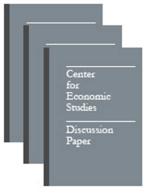The Effect of Child Support on Selection into Marriage and Fertility
The Effect of Child Support on Selection into Marriage and Fertility
Abstract
Child support policies in the United States have expanded dramatically since the mid-1970s and now cover 1 in 5 children. This paper studies the consequences of child support for marriage and fertility decisions. I first introduce a model showing that child support enforces ex ante commitment from men to provide financial support in the event of a child, which (1) increases premarital sex among couples unlikely to marry, and (2) reduces the abortion rate, by lessening the cost of raising a child as a single mom. Using variation in the timing and geography of the rollout of U.S. child support laws relative to the timing of pregnancy, from 1977 to 1992, I find that marriages following an unplanned pregnancy are less likely to occur under strengthened child support laws, accounting for about a 7-8 percentage point reduction relative to a base of 38 percent. I find that the child support rollout reduced the abortion rate by 1-2 per 1000 women aged 15-44, off a base of 28, representing about 50 percent of the total decline in the abortion rate over this period.
Others in Series
Working Paper
Working Paper
Working Paper




